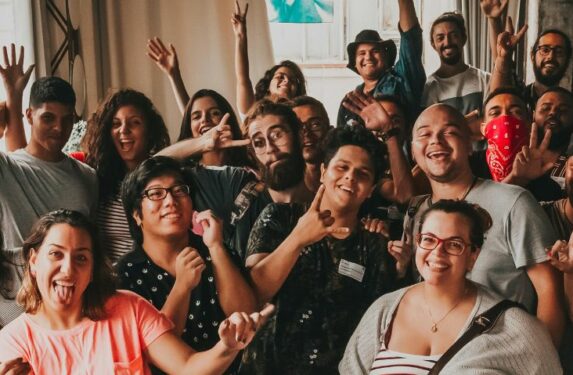
Recently I took part in SOMO2021 Advisory Board Roundtable – a social mobility discussion chaired by Tunde Banjoko OBE, founder of social justice charity Making The Leap. Every member of the advisory board is keen to prioritise social mobility and support the work of Tunde and his brilliant team, so it was an open discussion about the challenges posed in this area and how we can tackle them. It’s a subject that’s never felt more important, and this year’s exam results have only served to highlight how difficult it is for those without a privileged education.
But young people are only part of the picture. And herein lies one of the challenges faced by those trying to tackle the issues around social mobility – helping employers and beneficiaries understand exactly what social mobility means.
As part of the roundtable, participants were asked to define what social mobility means to them, and the results were interesting.
“Allowing people to realise the best of their ability no matter where they start”
“Lowering the barriers” “Levelling the playing field”
“Making the most of what everyone in your business has to offer”
“Self esteem and the ability to assert yourself”
“Attracting, hiring and keeping the right people in your organisation”
“Pulling people up and through your organisation”
“Fulfilling potential”
What this shows is there is no single, cohesive definition, and the subject is broad and complex. But clarity is vital if we’re going to engage employers in meaningful initiatives that help address inequality.
That doesn’t mean that things aren’t already happening. Already we’re seeing organisations removing CVs from every level of hiring to ensure candidates are fairly assessed. We also heard about mentoring and outreach activities in local communities, as well as staff networks that provide safe environments in which employees can talk about the issues they face. We talked about participation in externally-run initiatives like Kickstart, the Prison Leavers’ Project, Teach First and apprenticeship schemes.
The ambition and the passion for tackling this issue is heartening, but there are significant challenges. There’s no legal requirement to measure progress on social mobility, which limits motivation for large organisations to change recruitment process, track progress and assess effectiveness. Employees have also reported not feeling comfortable sharing information about their background, partly because discussing your parents’ education and your free school meal status can feel quite personal, and people question their employer’s motivation for asking.
Clearly, it’s vital that any discussion about how we tackle social mobility is developed in consultation with those who will benefit from these initiatives. These conversations have told us that beneficiaries want clear information about opportunities, and meaningful support and guidance that improves access to employment. Things like application and interview processes can be overwhelming, but clear guidance and support can make a huge difference. Most of all, beneficiaries of social mobility initiatives want what we all want – to be welcomed, to be listened to, to have their views heard and to be able to be themselves.
Which brings us back to the issue of definition, because people cannot engage meaningfully with something they don’t fully understand. Work on this is ongoing, taking into account existing definitions from organisations like the Social Mobility Commission, the Sutton Trust and the United Nations. All these have benefits and limitations, but one of our aims is to deliver a version that gives UK employers real clarity and purpose, and shows how social mobility intersects with other Diversity & Inclusion initiatives.
Making The Leap will be launching Social Mobility Awareness Day in the coming months, which will involve a social media campaign, a dedicated website and a toolkit for employers. The charity is also looking at ways to celebrate socially mobile role models as part of the UK Social Mobility Awards (SOMOs). Along with the rest of Advisory Board, I’m excited about what the future holds for social mobility initiatives in UK businesses, and proud to play a small part in making it happen. If you’re interested in getting involved, don’t hesitate to get in touch.
 Why start with EVP? 23 Apr Do you say “employer value proposition” or “employee value proposition?” At BrandPointZero we’ve (mostly) decided on the former. We think about EVP as a compelling […]
Why start with EVP? 23 Apr Do you say “employer value proposition” or “employee value proposition?” At BrandPointZero we’ve (mostly) decided on the former. We think about EVP as a compelling […] How to make your EVP work harder 6 Mar For many organisations, their EVPs & Employer Brands are associated with recruitment and resourcing. But during these uncertain economic times, we think the role of […]
How to make your EVP work harder 6 Mar For many organisations, their EVPs & Employer Brands are associated with recruitment and resourcing. But during these uncertain economic times, we think the role of […] Bristol agency BrandPointZero to merge with That Little Agency to create larger full-service employer brand marketing agency 4 Jan Bristol-based employer brand agency BrandPointZero has announced a merger with fellow Bristol agency That Little Agency, a move that will significantly increase the PointZero Group’s […]
Bristol agency BrandPointZero to merge with That Little Agency to create larger full-service employer brand marketing agency 4 Jan Bristol-based employer brand agency BrandPointZero has announced a merger with fellow Bristol agency That Little Agency, a move that will significantly increase the PointZero Group’s […]
